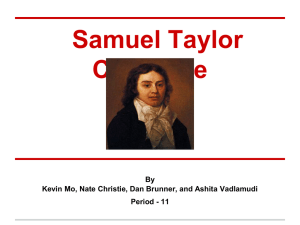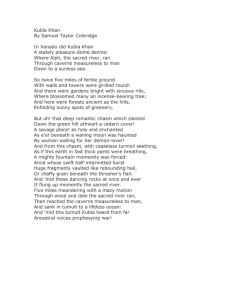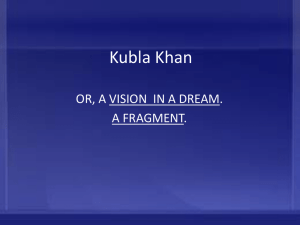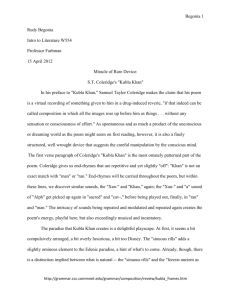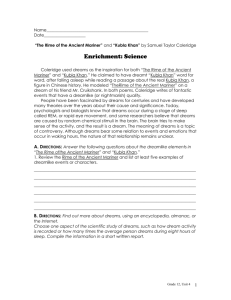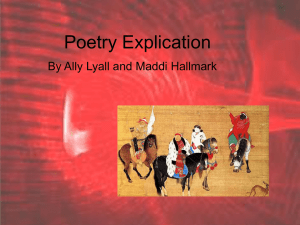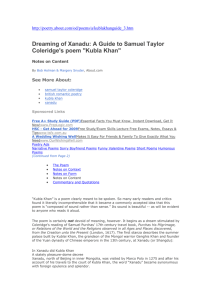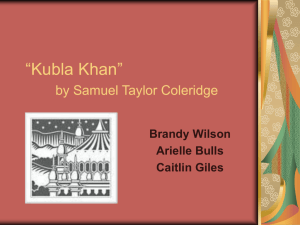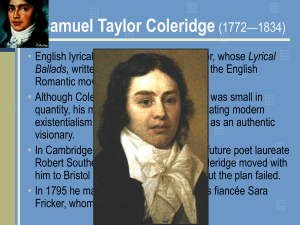Kubla Kahn Samuel Taylor Coleridge
advertisement
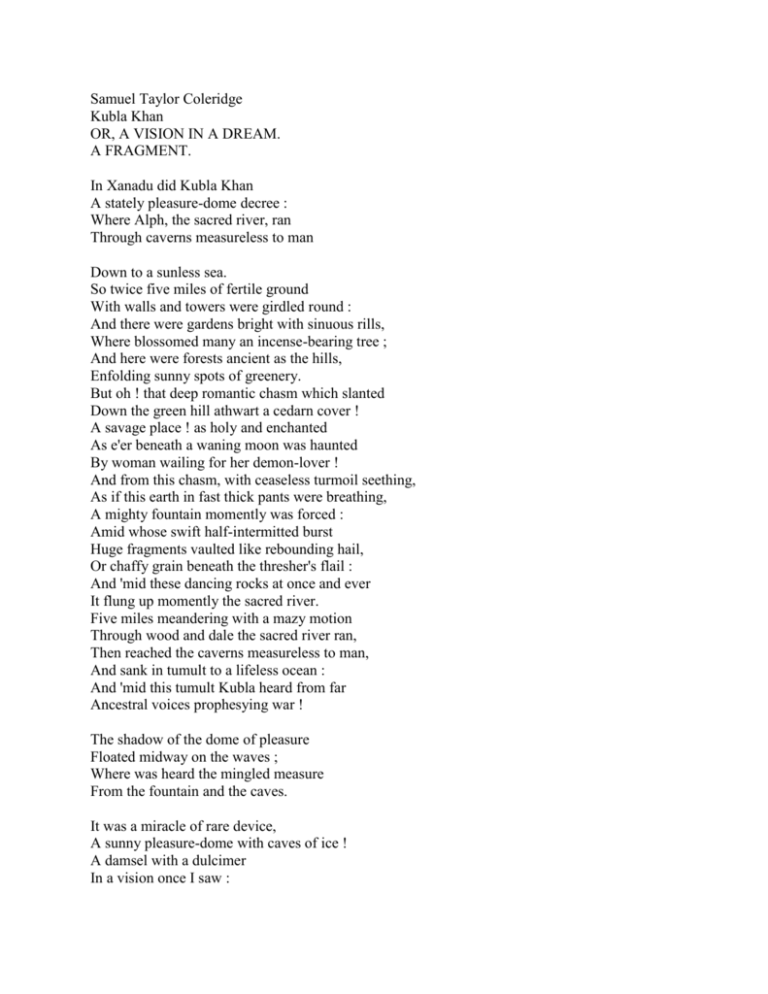
Samuel Taylor Coleridge Kubla Khan OR, A VISION IN A DREAM. A FRAGMENT. In Xanadu did Kubla Khan A stately pleasure-dome decree : Where Alph, the sacred river, ran Through caverns measureless to man Down to a sunless sea. So twice five miles of fertile ground With walls and towers were girdled round : And there were gardens bright with sinuous rills, Where blossomed many an incense-bearing tree ; And here were forests ancient as the hills, Enfolding sunny spots of greenery. But oh ! that deep romantic chasm which slanted Down the green hill athwart a cedarn cover ! A savage place ! as holy and enchanted As e'er beneath a waning moon was haunted By woman wailing for her demon-lover ! And from this chasm, with ceaseless turmoil seething, As if this earth in fast thick pants were breathing, A mighty fountain momently was forced : Amid whose swift half-intermitted burst Huge fragments vaulted like rebounding hail, Or chaffy grain beneath the thresher's flail : And 'mid these dancing rocks at once and ever It flung up momently the sacred river. Five miles meandering with a mazy motion Through wood and dale the sacred river ran, Then reached the caverns measureless to man, And sank in tumult to a lifeless ocean : And 'mid this tumult Kubla heard from far Ancestral voices prophesying war ! The shadow of the dome of pleasure Floated midway on the waves ; Where was heard the mingled measure From the fountain and the caves. It was a miracle of rare device, A sunny pleasure-dome with caves of ice ! A damsel with a dulcimer In a vision once I saw : It was an Abyssinian maid, And on her dulcimer she played, Singing of Mount Abora. Could I revive within me Her symphony and song, To such a deep delight 'twould win me, That with music loud and long, I would build that dome in air, That sunny dome ! those caves of ice ! And all who heard should see them there, And all should cry, Beware ! Beware ! His flashing eyes, his floating hair ! Weave a circle round him thrice, And close your eyes with holy dread, For he on honey-dew hath fed, And drunk the milk of Paradise. Xanadu An idyllic, beautiful place Kubla Khan Decree An authoritative order having the force of law Caverns A large cave Girdled Something that encircles like a belt Sinuous Characterized by many curves or turns; winding Rills A small brook; a rivulet. Chasm A deep, steep-sided opening in the earth's surface; an abyss or a gorge.f1 ² Athwart From side to side; crosswise or transversely Cedarn Waning To decrease gradually in size, amount, intensity, or degree; decline Seething To churn and foam as if boiling Fragments A small part broken off or detached.f12 m Vaulted To jump or leap over, especially with the aid of a support such as the hands or a pole. such as Rebounding To spring or bounce back after hitting or colliding with something.v. Chaffy The dry bracts enclosing mature grains of wheat and some other cereal grasses, removed during threshing Thresher's To beat the stems and husks of (grain or cereal plants) with a machine or flail to separate the grains or seeds from the straw.thresh Flail A manual threshing device consisting of a long wooden handle or staff and a shorter, free-swinging stick attached to its end.and a shorter, free-swinging stick attached to its end. v. Mazy Resembling a maze, as in design or complexity; labyrinthine28;; Caverns Tumult A disorderly commotion or disturbancepar Ancestral Of, relating to, or evolved from an ancestor or ancestorsue255 ; Damsel A young woman or girl; a maiden Dulcimer An instrument with wire strings of graduated lengths stretched over a sound box, played by striking with two padded hammers or by plucking Abyssinian E·thi·o·pi·a Formerly Ab·ys·sin·i·a (²b"¹-s¹n"¶-…) Abbr. Eth. 1. A country of northeast Africa. An ancient kingdom converted to Christianity in the 4th century A.D., the area was in turmoil after the rise of Islam in the 7th century and later (17th-18th century) was beset by ruinous civil wars. It became independent in 1896 but was held by Italy from 1935 to 1941. Addis Ababa is the capital and the largest city. Population, 32,775,000.he Œ?³'³A.D., the area was in turmoil after the rise of Islam in the 7th century and later (17th-18th century) was beset by ruinous civil wars. It became independent in 1896 but was held by Italy from 1935 to 1941. Addis Ababa is the capital and the largest city. Populati Dread To be in terror of·ed Coleridge's note, published with the poem The following fragment is here published at the request of a poet of great and deserved celebrity [Lord Byron], and, as far as the Author's own opinions are concerned, rather as a psychological curiosity, than on the ground of any supposed poetic merits. In the summer of the year 1797, the Author, then in ill health, had retired to a lonely farm-house between Porlock and Linton, on the Exmoor confines of Somerset and Devonshire. In consequence of a slight indisposition, an anodyne had been prescribed, from the effects of which he fell asleep in his chair at the moment that he was reading the following sentence, or words of the same substance, in Purchas's Pilgrimage: ``Here the Khan Kubla commanded a palace to be built, and a stately garden thereunto. And thus ten miles of fertile ground were inclosed with a wall.'' The Author continued for about three hours in a profound sleep, at least of the external senses, during which time he has the most vivid confidence, that he could not have composed less than from two to three hundred lines; if that indeed can be called composition in which all the images rose up before him as things, with a parallel production of the correspondent expressions, without any sensation or consciousness of effort. On awakening he appeared to himself to have a distinct recollection of the whole, and taking his pen, ink, and paper, instantly and eagerly wrote down the lines that are here preserved. At this moment he was unfortunately called out by a person on business from Porlock, and detained by him above an hour, and on his return to his room, found, to his no small surprise and mortification, that though he still retained some vague and dim recollection of the general purport of the vision, yet, with the exception of some eight or ten scattered lines and images, all the rest had passed away like the images on the surface of a stream into which a stone has been cast, but, alas! without the after restoration of the latter! Then all the charm Is broken--all that phantom-world so fair Vanishes, and a thousand circlets spread, And each mis-shape the other. Stay awile, Poor youth! who scarcely dar'st lift up thine eyes-The stream will soon renew its smoothness, soon The visions will return! And lo, he stays, And soon the fragments dim of lovely forms Come trembling back, unite, and now once more The pool becomes a mirror. Yet from the still surviving recollections in his mind, the Author has frequently purposed to finish for himself what had been originally, as it were, given to him. : but the to-morrow is yet to come. As a contrast to this vision, I have annexed a fragment of a very different character, describing with equal fidelity the dream of pain and disease. "Kubla Khan" Summary The speaker describes the "stately pleasure-dome" built in Xanadu according to the decree of Kubla Khan, in the place where Alph, the sacred river, ran "through caverns measureless to man / Down to a sunless sea." Walls and towers were raised around "twice five miles of fertile ground," filled with beautiful gardens and forests. A "deep romantic chasm" slanted down a green hill, occasionally spewing forth a violent and powerful burst of water, so great that it flung boulders up with it "like rebounding hail." The river ran five miles through the woods, finally sinking "in tumult to a lifeless ocean." Amid that tumult, in the place "as holy and enchanted / As e'er beneath a waning moon was haunted / By woman wailing to her demon-lover," Kubla heard "ancestral voices" bringing prophesies of war. The pleasure-dome's shadow floated on the waves, where the mingled sounds of the fountain and the caves could be heard. "It was a miracle of rare device," the speaker says, "A sunny pleasure-dome with caves of ice!" The speaker says that he once saw a "damsel with a dulcimer," an Abyssinian maid who played her dulcimer and sang "of Mount Abora." He says that if he could revive "her symphony and song" within him, he would rebuild the pleasure-dome out of music, and all who heard him would cry "Beware!" of "His flashing eyes, his floating hair!" The hearers would circle him thrice and close their eyes with "holy dread," knowing that he had tasted honeydew, "and drunk the milk of Paradise." Form The chant-like, musical incantations of "Kubla Khan" result from Coleridge's masterful use of iambic tetrameter and alternating rhyme schemes. The first stanza is written in tetrameter with a rhyme scheme of ABAABCCDEDE, alternating between staggered rhymes and couplets. The second stanza expands into tetrameter and follows roughly the same rhyming pattern, also expanded-- ABAABCCDDFFGGHIIHJJ. The third stanza tightens into tetrameter and rhymes ABABCC. The fourth stanza continues the tetrameter of the third and rhymes ABCCBDEDEFGFFFGHHG. Commentary Along with "The Rime of the Ancient Mariner," "Kubla Khan" is one of Coleridge's most famous and enduring poems. The story of its composition is also one of the most famous in the history of English poetry. As the poet explains in the short preface to this poem, he had fallen asleep after taking "an anodyne" prescribed "in consequence of a slight disposition" (this is a euphemism for opium, to which Coleridge was known to be addicted). Before falling asleep, he had been reading a story in which Kubla Khan commanded the building of a new palace; Coleridge claims that while he slept, he had a fantastic vision and composed simultaneously-while sleeping--some two or three hundred lines of poetry, "if that indeed can be called composition in which all the images rose up before him as things, with a parallel production of the correspondent expressions, without any sensation or conscious effort." Waking after about three hours, the poet seized a pen and began writing furiously; however, after copying down the first three stanzas of his dreamt poem--the first three stanzas of the current poem as we know it--he was interrupted by a "person on business from Porlock," who detained him for an hour. After this interruption, he was unable to recall the rest of the vision or the poetry he had composed in his opium dream. It is thought that the final stanza of the poem, thematizing the idea of the lost vision through the figure of the "damsel with a dulcimer" and the milk of Paradise, was written post-interruption. The mysterious person from Porlock is one of the most notorious and enigmatic figures in Coleridge's biography; no one knows who he was or why he disturbed the poet or what he wanted or, indeed, whether any of Coleridge's story is actually true. But the person from Porlock has become a metaphor for the malicious interruptions the world throws in the way of inspiration and genius, and "Kubla Khan," strange and ambiguous as it is, has become what is perhaps the definitive statement on the obstruction and thwarting of the visionary genius. Regrettably, the story of the poem's composition, while thematically rich in and of itself, often overshadows the poem proper, which is one of Coleridge's most haunting and beautiful. The first three stanzas are products of pure imagination: The pleasure-dome of Kubla Khan is not a useful metaphor for anything in particular (though in the context of the poem's history, it becomes a metaphor for the unbuilt monument of imagination); however, it is a fantastically prodigious descriptive act. The poem becomes especially evocative when, after the second stanza, the meter suddenly tightens; the resulting lines are terse and solid, almost beating out the sound of the war drums ("The shadow of the dome of pleasure / Floated midway on the waves..."). The fourth stanza states the theme of the poem as a whole (though "Kubla Khan" is almost impossible to consider as a unified whole, as its parts are so sharply divided). The speaker says that he once had a vision of the damsel singing of Mount Abora; this vision becomes a metaphor for Coleridge's vision of the 300-hundred-line masterpiece he never completed. The speaker insists that if he could only "revive" within him "her symphony and song," he would recreate the pleasure-dome out of music and words, and take on the persona of the magician or visionary. His hearers would recognize the dangerous power of the vision, which would manifest itself in his "flashing eyes" and "floating hair." But, awestruck, they would nonetheless dutifully take part in the ritual, recognizing that "he on honey-dew hath fed, / And drunk the milk of Paradise."
